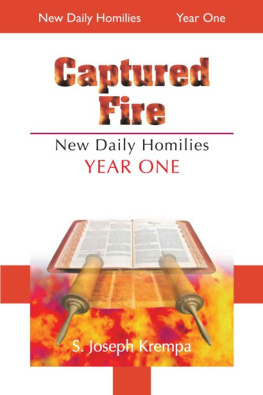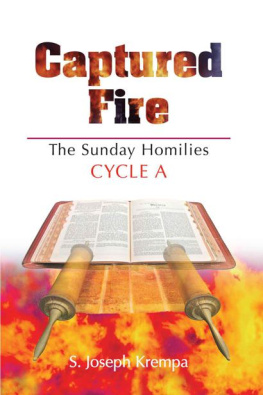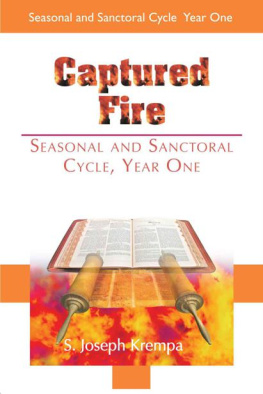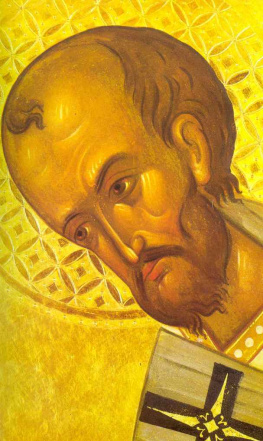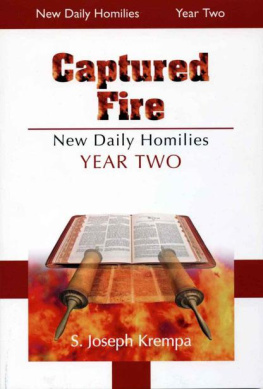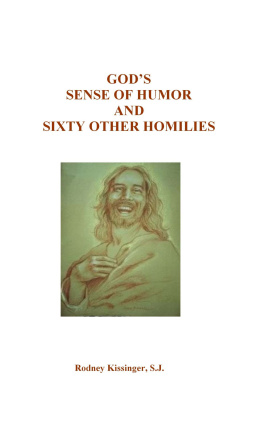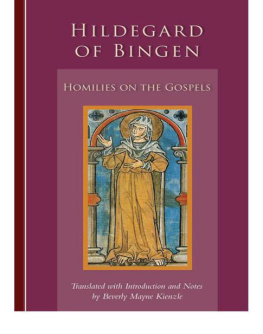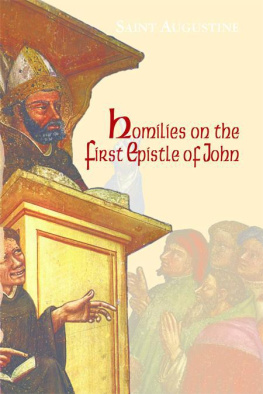CAPTURED FIRE
The New Daily Homilies Year One
Visit our web site at
www.albahouse.org
(for orders www.stpauls.us)
or call 1-800-343-2522 (ALBA)
and request current catalog

Library of Congress Cataloging-in-Publication Data
Krempa, Stanley J.
Captured fire: the new daily homilies, year One / by Stanley J. Krempa.
p. cm.
eBook ISBN: 978-0-81891-515-4
1. Catholic ChurchSermons. 2. Sermons, American. I. Title.
BX1756.K782C36 2008
252.6dc22
2008035227

Produced and designed in the United States of America by the
Fathers and Brothers of the Society of St. Paul,
2187 Victory Boulevard, Staten Island, New York 10314-6603
as part of their communications apostolate.

Copyright 2008 by the Society of St. Paul / Alba House

Printing Information:

Current Printing - first digit 1 2 3 4 5 6 7 8 9 10

Year of Current Printing - first year shown
2008 2009 2010 2011 2012 2013 2014 2015 2016 2017

Contents
Hebrews 1:1-6; Mark 1:14-20
Many Catholics have the custom of referring to their parish priest as my priest. They see their parish priest affectionately as their personal connection with the Church, its teaching, its sacraments and its authority.
The Letter to the Hebrews teaches us that Jesus is our priest. God is not a complete stranger to any culture. But now He has spoken fully, and finally in His Son, Jesus.
Jesus, our priest, brings about salvation and entry into the very life of the Trinity. The Letter to the Hebrews describes Him as being everything about which we sang at Christmas: the refulgence of the Fathers glory, imprint of Gods being, sustainer of the universe and agent of forgiveness to us.
This is made concrete in the life, Passion, Death and Resurrection of Jesus. He is our priest because He calls each one of us, as He calls the disciples in todays Gospel reading, to repent, to believe and to follow. We all can have a very personal, unique relationship with Jesus, our great high priest.
Repenting, believing and following make Christs priesthood and salvation personal to us. Some people repent repeatedly but are never confident of Christs forgiveness. Others believe but their failure to repent causes them to exhaust their energy in the inner civil war of a divided heart and insurgent emotions. Others follow on an occasional basis because of a failure to repent and believe. They have hardened themselves against the deep action of grace. We need all three: to repent, to believe and to follow.
This year is a chance for us once more to answer the Lords call and to experience the power of His priesthood. Jesus is our priest. If we repent, believe and follow, He will draw us into the deep life of the Trinity, show us the Fathers will and respond to our prayers for Gods grace in our life.
His priesthood will not be only something we study but something we experience in our life.
Hebrews 2:5-12; Mark 1:21-28
Todays reading from the Letter to the Hebrews is about human dignity lost and then found.
The letter quotes Scripture about the dignity of humanity that is superior to all creation. We are made in the image and likeness of God, little less than the angels. To be made in the image of God means that we have the power to probe and to understand the universe and ourselves. We have the power of will to rise above instinct and emotion in order to direct our life. We have a spiritual and immortal soul that will last forever. We have the power of conscience to discern right and wrong. We have the capacity to be in communion with God. We are capable of transforming others by our love and of being transformed by theirs.
But these very gifts, our glory, can be and have been disfigured. Intelligence and will power can be used ruthlessly. Our desire for God can be twisted out of shape and turned toward lesser creatures in a destructive fanaticism. Conscience can be degraded into rationalizing almost anything. Our love can become manipulative and domineering.
This kind of world is not a product of science fiction writing or fevered sermons. It is a world with which we are all familiar because we live within it every day.
Jesus came to restore our dignity and to give us the grace to put all things in order once more. The demonic control from which Jesus releases the man in todays Gospel prefigures the liberation He brings to all of humanity. Human dignity regained is what redemption is all about.
The Letter to the Hebrews says that Jesus life on earth shows us how we can maintain our dignity in a fallen world. He is our leader or pioneer (in an older translation). He showed the way we can now follow with His grace.
The work of Jesus redemption shows the great respect the Lord has for us and for our dignity. Do we respect ourselves and our created dignity half as much as He does? Are we willing to settle for what we are or to strive for what we can be in Christ?
Hebrews 2:14-18; Mark 1:29-39
The Letter to the Hebrews describes Jesus as freeing those who through fear of death had been subject to slavery their whole life. It speaks of the power of the devil as enhanced by our fear of death. At first, one would think the opposite to be true. The fear of death usually triggers faith since, as the old saying goes, there are no atheists in foxholes.
The point here is more subtle. A person without faith in God fears that if we dont make it here, we wont make it anywhere.
The result is that we feel we must find perfect happiness here. We have to find perfect justice here. We have to find perfect love here. We have to find the perfect relationship here. We have to find the perfect job here. If we dont find these here, we are afraid it will never happen. We entrust our total future and total happiness to this world. We end up doing anything to make these happen and to find perfect fulfillment here. Of course, we never do and, slowly, we become slaves to sin.
Christ frees us who through fear of death have become such slaves. The Lord teaches us that the fulfillment of the inborn strivings in our hearts, souls and minds is something this world cannot completely deliver. They are signs that we are built for God.
If we think we have the perfect marriage here, give it time. If we think we have found the perfect neighborhood in which to live, give it time. Everything in this world disappoints sooner or later. Even our bodies, so vigorous and resilient in youth, eventually show wear and tear.

